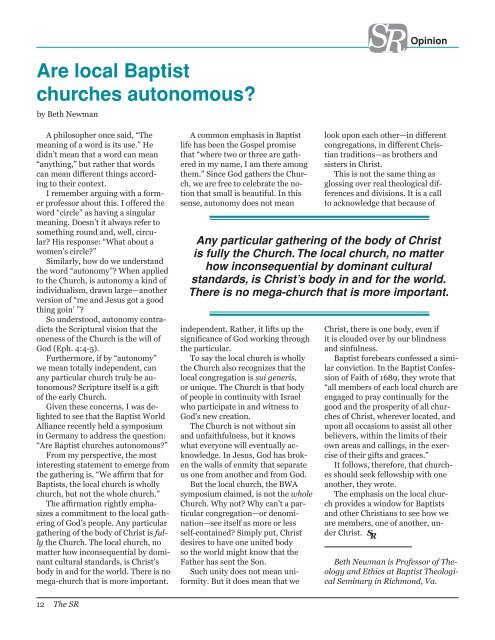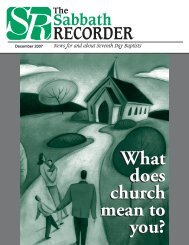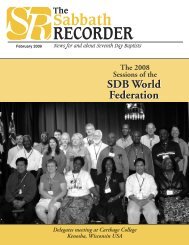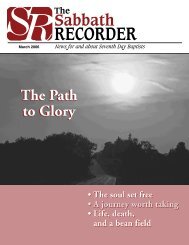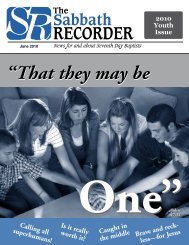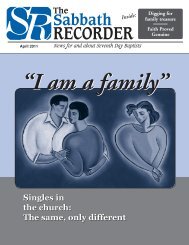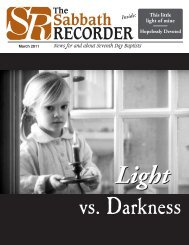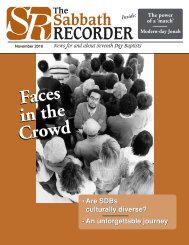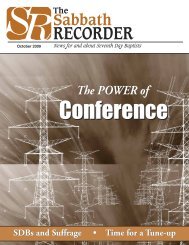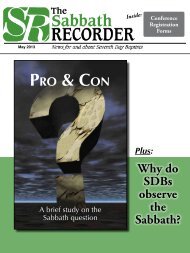Jul-Aug 2007 - Seventh Day Baptist | General Conference of the ...
Jul-Aug 2007 - Seventh Day Baptist | General Conference of the ...
Jul-Aug 2007 - Seventh Day Baptist | General Conference of the ...
You also want an ePaper? Increase the reach of your titles
YUMPU automatically turns print PDFs into web optimized ePapers that Google loves.
Are local <strong>Baptist</strong><br />
churches autonomous?<br />
by Beth Newman<br />
SR R Opinion<br />
A philosopher once said, “The<br />
meaning <strong>of</strong> a word is its use.” He<br />
didn’t mean that a word can mean<br />
“anything,” but ra<strong>the</strong>r that words<br />
can mean different things according<br />
to <strong>the</strong>ir context.<br />
I remember arguing with a former<br />
pr<strong>of</strong>essor about this. I <strong>of</strong>fered <strong>the</strong><br />
word “circle” as having a singular<br />
meaning. Doesn’t it always refer to<br />
something round and, well, circular?<br />
His response: “What about a<br />
women’s circle?”<br />
Similarly, how do we understand<br />
<strong>the</strong> word “autonomy”? When applied<br />
to <strong>the</strong> Church, is autonomy a kind <strong>of</strong><br />
individualism, drawn large—ano<strong>the</strong>r<br />
version <strong>of</strong> “me and Jesus got a good<br />
thing goin’ ”?<br />
So understood, autonomy contradicts<br />
<strong>the</strong> Scriptural vision that <strong>the</strong><br />
oneness <strong>of</strong> <strong>the</strong> Church is <strong>the</strong> will <strong>of</strong><br />
God (Eph. 4:4-5).<br />
Fur<strong>the</strong>rmore, if by “autonomy”<br />
we mean totally independent, can<br />
any particular church truly be autonomous?<br />
Scripture itself is a gift<br />
<strong>of</strong> <strong>the</strong> early Church.<br />
Given <strong>the</strong>se concerns, I was delighted<br />
to see that <strong>the</strong> <strong>Baptist</strong> World<br />
Alliance recently held a symposium<br />
in Germany to address <strong>the</strong> question:<br />
“Are <strong>Baptist</strong> churches autonomous?”<br />
From my perspective, <strong>the</strong> most<br />
interesting statement to emerge from<br />
<strong>the</strong> ga<strong>the</strong>ring is, “We affirm that for<br />
<strong>Baptist</strong>s, <strong>the</strong> local church is wholly<br />
church, but not <strong>the</strong> whole church.”<br />
The affirmation rightly emphasizes<br />
a commitment to <strong>the</strong> local ga<strong>the</strong>ring<br />
<strong>of</strong> God’s people. Any particular<br />
ga<strong>the</strong>ring <strong>of</strong> <strong>the</strong> body <strong>of</strong> Christ is fully<br />
<strong>the</strong> Church. The local church, no<br />
matter how inconsequential by dominant<br />
cultural standards, is Christ’s<br />
body in and for <strong>the</strong> world. There is no<br />
mega-church that is more important.<br />
A common emphasis in <strong>Baptist</strong><br />
life has been <strong>the</strong> Gospel promise<br />
that “where two or three are ga<strong>the</strong>red<br />
in my name, I am <strong>the</strong>re among<br />
<strong>the</strong>m.” Since God ga<strong>the</strong>rs <strong>the</strong> Church,<br />
we are free to celebrate <strong>the</strong> notion<br />
that small is beautiful. In this<br />
sense, autonomy does not mean<br />
independent. Ra<strong>the</strong>r, it lifts up <strong>the</strong><br />
significance <strong>of</strong> God working through<br />
<strong>the</strong> particular.<br />
To say <strong>the</strong> local church is wholly<br />
<strong>the</strong> Church also recognizes that <strong>the</strong><br />
local congregation is sui generis,<br />
or unique. The Church is that body<br />
<strong>of</strong> people in continuity with Israel<br />
who participate in and witness to<br />
God’s new creation.<br />
The Church is not without sin<br />
and unfaithfulness, but it knows<br />
what everyone will eventually acknowledge.<br />
In Jesus, God has broken<br />
<strong>the</strong> walls <strong>of</strong> enmity that separate<br />
us one from ano<strong>the</strong>r and from God.<br />
But <strong>the</strong> local church, <strong>the</strong> BWA<br />
symposium claimed, is not <strong>the</strong> whole<br />
Church. Why not? Why can’t a particular<br />
congregation—or denomination—see<br />
itself as more or less<br />
self-contained? Simply put, Christ<br />
desires to have one united body<br />
so <strong>the</strong> world might know that <strong>the</strong><br />
Fa<strong>the</strong>r has sent <strong>the</strong> Son.<br />
Such unity does not mean uniformity.<br />
But it does mean that we<br />
look upon each o<strong>the</strong>r—in different<br />
congregations, in different Christian<br />
traditions—as bro<strong>the</strong>rs and<br />
sisters in Christ.<br />
This is not <strong>the</strong> same thing as<br />
glossing over real <strong>the</strong>ological differences<br />
and divisions. It is a call<br />
to acknowledge that because <strong>of</strong><br />
Any particular ga<strong>the</strong>ring <strong>of</strong> <strong>the</strong> body <strong>of</strong> Christ<br />
is fully <strong>the</strong> Church. The local church, no matter<br />
how inconsequential by dominant cultural<br />
standards, is Christ’s body in and for <strong>the</strong> world.<br />
There is no mega-church that is more important.<br />
Christ, <strong>the</strong>re is one body, even if<br />
it is clouded over by our blindness<br />
and sinfulness.<br />
<strong>Baptist</strong> forebears confessed a similar<br />
conviction. In <strong>the</strong> <strong>Baptist</strong> Confession<br />
<strong>of</strong> Faith <strong>of</strong> 1689, <strong>the</strong>y wrote that<br />
“all members <strong>of</strong> each local church are<br />
engaged to pray continually for <strong>the</strong><br />
good and <strong>the</strong> prosperity <strong>of</strong> all churches<br />
<strong>of</strong> Christ, wherever located, and<br />
upon all occasions to assist all o<strong>the</strong>r<br />
believers, within <strong>the</strong> limits <strong>of</strong> <strong>the</strong>ir<br />
own areas and callings, in <strong>the</strong> exercise<br />
<strong>of</strong> <strong>the</strong>ir gifts and graces.”<br />
It follows, <strong>the</strong>refore, that churches<br />
should seek fellowship with one<br />
ano<strong>the</strong>r, <strong>the</strong>y wrote.<br />
The emphasis on <strong>the</strong> local church<br />
provides a window for <strong>Baptist</strong>s<br />
and o<strong>the</strong>r Christians to see how we<br />
are members, one <strong>of</strong> ano<strong>the</strong>r, under<br />
Christ. S R<br />
Beth Newman is Pr<strong>of</strong>essor <strong>of</strong> Theology<br />
and Ethics at <strong>Baptist</strong> Theological<br />
Seminary in Richmond, Va.<br />
12 The SR


